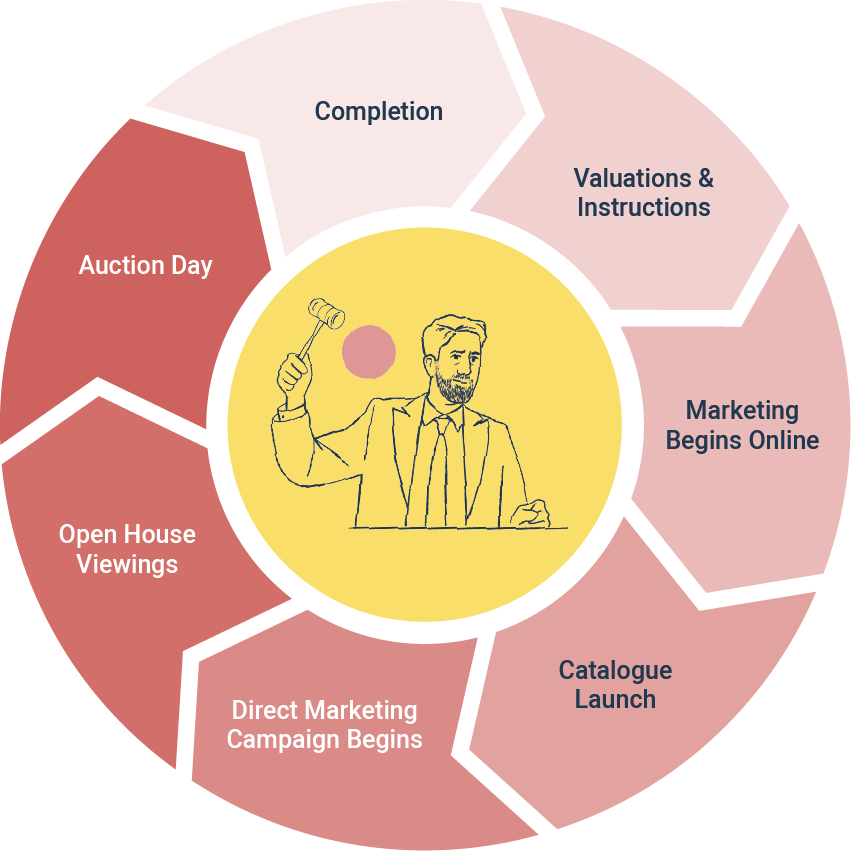At Probate.auction, we often receive questions about the probate process, so we’ve compiled the most common ones to guide you through selling your probate property at auction.

What is probate?
Probate is the legal procedure through which a deceased person’s estate is managed and distributed. This process involves validating the will (if there is one), settling any outstanding debts or taxes, and distributing the remaining assets to the beneficiaries. If there is no will, the estate will be distributed according to the state’s laws under “intestate” probate. In probate auctions, the property being sold is part of the deceased’s estate and is being auctioned off as part of the probate process.
How do I start the probate process?
The first step in the probate process is to file the will with the court and appoint the estate’s executor. If the deceased has a valid will, the executor is usually a family member or close associate. If there is no will, an administrator will be appointed to handle the estate. A solicitor will be responsible for guiding the executor or administrator through the probate process, ensuring that all legal formalities are completed, including the validation of the will, the filing of necessary court documents, and the payment of any debts or taxes owed by the estate. While you can list the property for sale before probate is fully finalised, the sale cannot be completed until the probate process is officially concluded. This ensures that all legal matters regarding the estate are properly settled before the transfer of ownership takes place.
Why sell my probate property at auction?
Selling probate property at auction is a fast and efficient option. When the auctioneer’s gavel falls, the contract is exchanged immediately, and the sale is typically completed within 20 working days. Auctions create a competitive bidding environment, which may result in a sale price that exceeds the initial estimate. Auctions are also a great option for properties that need repairs or renovations, as they attract buyers who are specifically looking for fixer-uppers.
We have created a ‘Probate Auction Process Wheel’ to help guide you. I go into greater detail below, but this is a good overview of what happens…

How do I prepare my property for auction?
Contact Probate.Auction to arrange a professional valuation of your property. We will then work with you to select the ideal auction date and ensure the reserve price is set at a competitive yet realistic level, based on our expert valuation. First and foremost, it’s essential to remove any valuables and important documents, such as title deeds and legal paperwork, from the property. To make the property as appealing as possible to potential buyers, ensure it is clean, well-maintained, and visually inviting. You can either handle this yourself or hire a clearance company to assist. We understand that visiting the property may not always be feasible due to location or the scale of the task. At Probate.Auction, we are here to guide you through every step of the process, or, if you prefer, you can choose to place the property in its current condition directly into the auction.
What happens when my property goes on the market?
Once your property is listed for auction, it will be marketed to potential buyers across a range of platforms, including Rightmove, Zoopla, OnTheMarket, as well as various social media channels and direct marketing. In the lead-up to auction day, interested buyers will have the opportunity to view the property during one of our five open house viewing days. Additionally, they can explore our comprehensive online marketing materials, which may include professional exterior and interior photographs, a video walkthrough tour, a 360-degree virtual tour, drone footage, a floor plan, and a map (subject to the property). This multi-channel approach ensures maximum exposure to a wide audience of potential buyers.

What happens when my property sells at auction?
Once your property sells at Probate.auction, the process moves quickly and efficiently. Here’s what happens next:
- Contract Exchange: When the auctioneer’s gavel falls and the property is sold, the contract is immediately exchanged between the buyer and the seller. This means the sale is legally binding, and both parties are committed to completing the transaction.
- Deposit Payment: The buyer is required to pay a deposit, typically 10% of the sale price, at the time of the auction.
- Solicitors: The auctioneer will send all documentation to both your solicitor and the vendor’s solicitor to begin the conveyancing process.
- Completion Date: Completion usually occurs 20 working days after the auction. On this date, the remaining balance of the sale price is paid by the buyer, and ownership of the property is transferred to them.
- Funds Transfer: Once the buyer’s full payment has been received, the funds are transferred to you or the estate’s designated account.
- Key Handover: After completion, the auctioneer will arrange key handover with the buyer.
Throughout the entire process, Probate.auction is dedicated to ensuring that everything progresses smoothly and efficiently. We take pride in providing a seamless experience, making sure that both the seller and the buyer meet their obligations in a timely and professional manner.
Our team is always available to support you at every step. If you have any questions or concerns along the way, we are here to offer guidance and assistance to ensure a hassle-free transact.
If you have any questions regarding this article or have a property to sell at auction, please email Danielle@probate.auction

